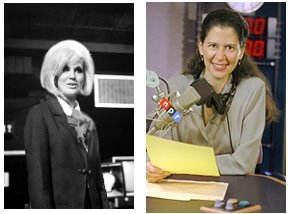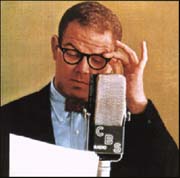 “Wow, this song reminds me so much of some other song, only I can’t think of what that other song is while this song is playing, but if I turn off this song, I’ll forget what the other one sounds like.”
“Wow, this song reminds me so much of some other song, only I can’t think of what that other song is while this song is playing, but if I turn off this song, I’ll forget what the other one sounds like.”
Sometimes, it’s coincidence. One song just happens to sound like another. I refer you to the words of Mr. Andy Breckman, who wants this phrase on his tombstone: These Things Happen.
Sometimes, it’s carefully plotted strategy (Gary Puckett and the Union Gap always made sure that their next hit contained roughly the same notes in roughly the same order as their previous hit).
Sometimes, it’s an honest mistake. The late George Harrison didn’t consciously elevate He’s So Fine into the realm of the sacred as My Sweet Lord. (When Paul McCartney was convinced that he had stolen the melody of Yesterday unconsciously, he hummed the tune to dozens of friends who failed to identify it, leading Paul to eventually conclude that he did, in fact, write it in his sleep).
Sometimes, egregious thievery is involved. That’s the subject of this post, although some of these amazing sound-alikes may not have resulted from conscious lifts.
The first one did, though:
The Song You Know is Venus by Shocking Blue (1970)
Why was Dutch group Shocking Blue a one-hit wonder? Maybe because they stole their hit song from The Big Three featuring Cass Elliot (before she became a Momma). Oh, and you’ll notice, in the opening notes, that Shocking Blue also “borrowed” Pete Townsend’s signature guitar riff from Pinball Wizard, released the previous year.
The song Shocking Blue wishes would disappear is Banjo Song by The Big Three (1963). (OK, The Big Three “borrowed” some lyrics from Stephen Foster, but still…)
———-
Another song: Ernie’s Tune by the Tony DeSimone Trio. The instantly recognizable song was actually titled Oriental Blues and is credited to Jack Newton. It accompanied some of the best comedy ever to appear on TV.
[2021 note: Don's original YouTube video has disappeared; this is another one of the same song.]What a great song it is – worthy of a George Gershwin. Very worthy.
Rialto Ripples by George Gershwin.
———-
Last but not least, one that I’ve been thinking about for a couple of months. It is The Theme to National Public Radio’s “All Things Considered.”
When you’re pledging to your local public radio station to support Melissa Block, you might want to send a couple of bucks to the poor devil (Randy Newman)who wrote Just One Smile by Dusty Springfield. (Wait for the chorus).
And in the picture above, Dusty Springfield looks strangely similar to Paula Poundstone in a blonde wig.

